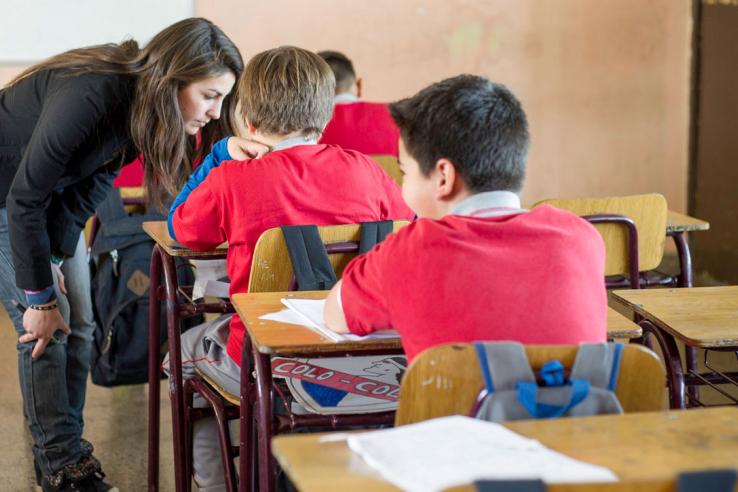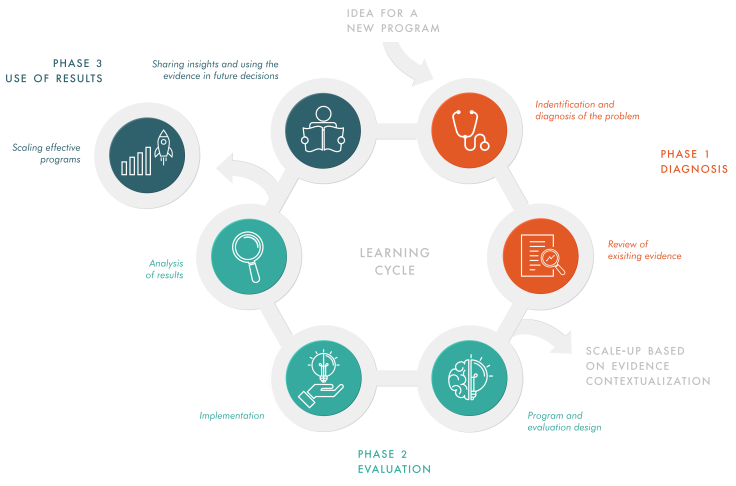A government innovation lab to improve education

The Peruvian Ministry of Education, with assistance from J-PAL and Innovations for Poverty Action (IPA), created MineduLAB—an innovation hub housed within the ministry that designs, evaluates, and scales effective solutions to educational challenges. As of 2018, MineduLAB has conducted nine randomized evaluations and has committed to scaling up three programs found to be effective. MineduLAB has also informed the design of similar innovation laboratories in Latin America.
The Problem
Innovating and testing promising new solutions to policy issues within government ministries is often considered risky and bureaucrats are often incentivized to stick to the status quo.
Prior to the creation of MineduLAB in 2014, the Peruvian Ministry of Education had few avenues to test promising innovations in education policy in a systematic and institutionalized way. In 2013, J-PAL and IPA staff in Peru began conversations with the ministry about how to promote a culture of innovation and evidence use within the policy decision-making process. The idea was to create a space to identify potential solutions to key problems, pilot and rigorously test them in schools, and scale the programs that prove cost-effective.
Together, J-PAL, IPA, and the Ministry of Education developed a lab to identify and test low-cost innovations. By institutionalizing the lab within the ministry’s own monitoring and evaluation unit and creating formal structures, institutional processes, and training dedicated personnel, the partners built the foundations for a broader culture of innovation and evidence use, which has been sustained as “MineduLAB.”
The Policy Solution
MineduLAB follows an institutional learning cycle to identify areas for innovation, evaluate new programs, and determine when to bring effective interventions to scale.
MineduLAB follows an adapted version of an "institutional learning cycle" (see Figure 1), conceptualized by J-PAL LAC to guide when and how to use evidence to test the impact of selected innovations.

Each year, the Ministry of Education identifies priority areas and solicits proposals from researchers, implementing units within the ministry, and practitioners for promising innovations to address these concerns. The proposed innovations must meet the following criteria:
- Creative solutions to improve existing programs or policies;
- Low-cost with high potential for impact; and
- Testable through randomized evaluations leveraging administrative data.
For example, in the 2017 call for proposals, the lab identified two priority areas: increasing parental involvement in their children’s education and bridging the learning gap between boys and girls. A Research Advisory Board, composed of distinguished education researchers working in Latin America, filters proposals based on their relevance to priority themes and the viability of evaluating them.1 Based on these recommendations, the Secretary of Strategic Planning selects the innovations to be implemented and tested.The proposed innovation first passes through the diagnostic stage (see Figure 1), which includes developing or strengthening the program’s theory of change and conducting an evidence review of similar interventions. To date, all nine of MineduLAB’s selected innovations have incorporated randomized evaluations that use government administrative data to assess program impact. As of 2018, six evaluations have been completed and three are ongoing.2
With MineduLAB we established a culture of the use of evidence, very close to the decision-making process, in real time if possible. And it was a space to innovative, monitor, and evaluate policy initiatives aimed at solving the sometimes intractable education challenges, so that they were adjusted and continuously adapted as they were scaled up.
— Jaime Saavedra, Former Minister of Education, Peru; Senior Director, Education, World Bank
From Research to Action
MineduLAB has scaled up one successful innovation and is scaling two additional innovations tested by randomized evaluations.
The Ministry of Education has committed to using low-cost evaluations to identify and scale policies found to have sizeable impacts. Since its formation, MineduLAB has brought two programs, SMS PRONIED and Deciding for a Better Future (DFM), to scale and is actively scaling up one additional intervention, Growth Mindset.
In 2017, MineduLAB completed the learning cycle and scaled up the SMS PRONIED intervention. This program involves sending improved text messages to school administrators to hold them accountable for maintenance and administrative activities. During 2017, 54,238 school administrators received the monitoring and social norm messages found to be effective in the randomized evaluation to increase compliance with administrative duties.
After an evaluation by J-PAL affiliates Francisco Gallego (Pontificia Universidad Católica de Chile) and Christopher Neilson (Princeton University), together with Oswaldo Molina, the DFM program was scaled up to all secondary schools with a full class day. In the evaluation, researchers tested whether providing students and families with information on the monetary and non-monetary returns to completing secondary and tertiary education reduced dropout and improved learning. Results show that students underestimated the returns to education and that DFM’s information campaign was successful in reducing student dropouts. In 2018, the program was implemented in more than 2,000 secondary schools, reaching 566,659 students.
The MineduLAB team is also currently working with implementers to design the scale-up of the Growth Mindset intervention, which was found to have positive impacts on educational outcomes.
MineduLAB has inspired the creation of other social policy and evaluation innovation labs in Latin America. These include Ayni Lab, an innovation lab created by the Peruvian Ministry of Development and Social Inclusion that receives technical assistance from J-PAL and IPA, as well as an innovation lab for education in the Argentinian province of Salta, supported by J-PAL with Alejandro Ganimian (NYU) as the academic lead.
Abdul Latif Jameel Poverty Action Lab (J-PAL). 2018. "A government innovation lab to improve education." J-PAL Evidence to Policy Case Study. Last modified October 2018.